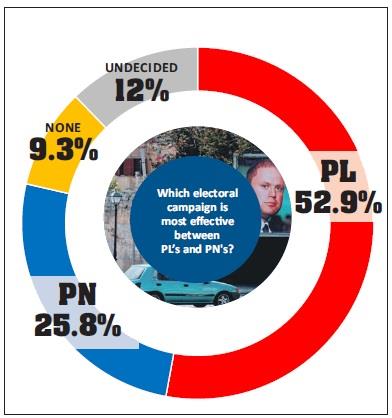A majority of 52.9% believe that the Labour Party’s (PL) electoral campaign was the most effective when contacted for their responses after week one of the campaign.
Respondents were simply asked: Which electoral campaign is most effective between the PL’s and the Nationalist Party’s (PN)? Overall, 52.9% of respondents chose the PL, 25.7% chose PN, 9.2% chose ‘none’ and 12.2% are undecided. Interviews for this eighth edition of the iSurvey were made between 8 and 11 May, just after the country began digesting week one of the campaign trail.
As both mainstream parties quickly rolled out their electoral campaign slogans, the PL’s being ‘the best time for our country’ and the PN’s being ‘I choose Malta’, it was evident from the word Go that the PL would be focusing on the economy and its successes over the past four years while the PN would be focusing on corruption.
Building on this weekend’s survey results which saw Prime Minister Joseph Muscat’s position as most trusted leader strengthened, it would therefore make sense that a majority of people find the PL’s electoral campaign as more effective than that of the PN.
The PN, while saying that this is an election based on principles and not proposals, has rolled out several populist pre-electoral pledges in order to shift public discourse to the issue of corruption from one about what the various parties are actually offering.

Launching the PN’s e-democracy platform appears to be a step in the right direction. The platform is intended to crowd-source policy proposals, where anybody can make a contribution and up-vote or down-vote someone else’s proposal. This seems to be viewed favourably by the public. The platform was launched on the eve of 11 May, after all 400 respondents were contacted, therefore it is not possible to assess whether this move improved the public’s perception of the PN’s campaign.
2013 PN voters least convinced about either campaign
When taking into consideration the PN and PL voter split, it can be said that PL voters are far more convinced about their own party’s campaign than their PN counterparts are convinced about the PN’s campaign.
It can also be said that the party with the highest proportion of voters who are not convinced by either the PN or the PL campaign can be found within the PN.
A proportion of 21.2% of 2013 PN voters could not decide which campaign is more effective, while 10.2% of 2013 PN voters said that neither campaign is the most effective. A total of 19.2% of 2013 PN voters said the PL’s campaign is more effective and 49.4% chose the PN’s.
Out of 2013 PL voters, 80.3% believe that their own party has the most effective campaign, 7.8% chose the PN’s, 6.4% said ‘none’ and 5.5% are undecided.

When breaking down responses based on voting intentions for the upcoming snap election on 3 June, those who intend to vote PN are less divided and more sure of their party’s campaign when compared with the views of 2013 PN voters.
Out of those who say they will be voting PN on 3 June, 14% think the PL’s campaign is most effective, 65.8% chose the PN’s, 7.1% said ‘none’ and 13% are undecided.
Turning to those who say they will be voting PL, 95.6% think their party has the most effective campaign, 0.6% chose the PN’s, 1.1% said none and 2.6% are undecided.
PL voters are overwhelmingly more convinced of their party’s electoral campaign, with PN voters being much more divided.
Historically, PL voters are known to be more loyal to their party than PN voters, which can be exhibited by the loyalty shown among PL voters.

Age split
The youngest age cohort, at 18-24, had the highest proportion of respondents who chose the PL’s campaign over the PN’s, at 66.7%, out of all age cohorts. The highest proportion of respondents which chose the PN’s over the PL’s came from the 45-54 group, at 33.3%.
The grouping which were least phased by both campaigns, and there registered the highest proportion of people who chose ‘none’ were those aged between 35-44, at 20.6%. The groupings that are most unsure about how to respond to the question are those aged 65+ at 19.7%, and second highest ‘don’t knows’ where registered by 25-34 year-olds, at 18.7%.
The May 2017 iSurvey – the eighth of its kind – was commissioned to Business Leaders Malta on behalf of The Malta Independent. A total of 600 respondents were used, representative of age, gender and spread of localities. With such a sample size, the margin of error is +/- 4%. More info on the iSurvey will be disclosed throughout the week.